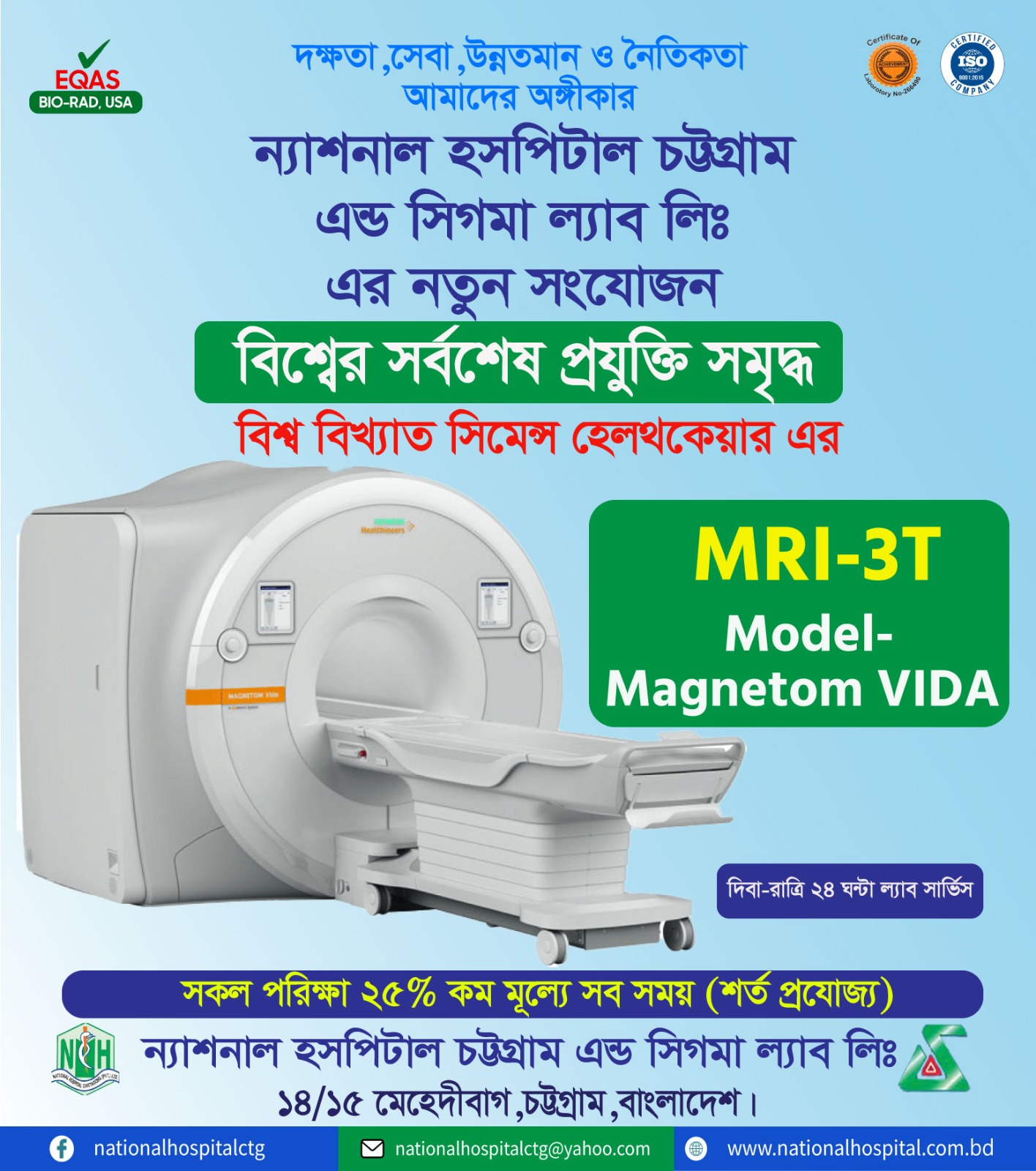Best MRI Test in Chittagong

What is MRI test?
MRI is a noninvasive technology that generates detailed three-dimensional anatomical images of the body commonly employed for disease detection, diagnosis, and treatment monitoring. By placing the patient within a large magnet, MRI utilizes radio waves to excite and detect changes in proton rotational axes in water, constituting living tissues. Resultant images offer insight into organs, bones, muscles, and blood vessels. MRI scans play a crucial role in diagnosing conditions such as brain tumours, aneurysms, and abnormalities. Scan duration varies (20-60 minutes), and contrast agents may be used for enhanced tissue visibility. Unlike X-rays, MRI is radiation-free, but disclosing metal implants is crucial to ensure safety. Overall, MRI stands as a safe and valuable tool in medical imaging, furnishing detailed images for precise diagnosis and treatment planning.
SIEMENS 3Tesla MRI
48 Channel (Magnetom Vida)
Best MRI Test in Chittagong
As Chittagong's leading private healthcare facility, National Hospital offers high-quality MRI tests. Here are the features of the National Hospital MRI:
1. 3Tesla 48 channels of the latest German technology with the world's first biometrics technology.
2. Open MRI machine of 70cm (27.56 inches) Bore to relieve patients from Claustrophobia.
3. Equipped with Turbo Suite Acceleration capabilities, 50% faster, noiseless and comfortable full-body MRI for patients of all ages, from children to the elderly.
4. 60/200 XT Power Gradient ensures 25% clearer and sharper images.
5. Advantages of MRI even after having MRI-Conditional Metallic Implant in the body.
6. New Generation ultra-high-density 18-channel UltraFlex coils can capture clear, flexible, fast images.
7. Inline Compressed Sensing (GRASP-VIBE) Application supports continuous breathing in children, elderly and pregnant patients.
8. Use of Diffusion Tensor Imaging (DTI) Trantographic SWI Ges Perfusion Imaging Software for Brain Hemorrhage and Tumor Examination and Research.
9. Facilitation of providing reports on CD/Email at the earliest for patients' convenience.
10. International standard reports.
MRI Test
MRI tests are often preferred over CT scans for imaging non-bony or soft tissues, offering clearer pictures of the brain, spinal cord, nerves, muscles, ligaments, and tendons. Their safety lies in the absence of damaging ionizing radiation, a key distinction from X-rays. However, not everyone is a candidate for MRI due to potential interference with metal implants or devices like pacemakers. In such cases, CT scans become a viable alternative. Although a safer option, MRI scans are more expensive than X-rays or CT scans. With diverse disease detection, diagnosis, and treatment monitoring applications, MRI proves invaluable for examining injuries, tumours, heart issues, and more. Continuous refinement of MRI techniques contributes to their role in enhancing medical procedures and research.
MRI Test Price in Bangladesh
The price of an MRI test in Bangladesh can vary depending on the specific type of test and the healthcare facility. Here are some examples of approximate MRI Test Prices in Bangladesh:
1. The price for a CT/MRI Extra Film-2 is 1,000 BDT, while the price for a CT/MRI Extra Film-3 is 1,500 BDT. The prices increase with additional films, with CT/MRI Extra Film-6 costing 3,000 BDT.
2. The price for an MRI of the brain is 7,000 BDT, while a cardiac MRI is 20,000 BDT. The prices vary depending on the specific type of MRI test.
3. Government fees for MRI tests in Bangladesh: For example, an MRI of the brain without contrast is listed as 3,000 BDT, while an MRI with contrast is listed as 4,000 BDT. The prices also vary depending on the specific area being scanned.
It's important to note that these prices may vary depending on the healthcare facility and location. It is recommended to contact the National Hospital & Sigma Lab in Chittagong, Bangladesh, for accurate and up-to-date pricing information.
How MRI Test Works
MRI uses a large magnet, radio waves, and a computer to create detailed, cross-sectional images of internal organs and structures. The process involves the following steps:
1. The patient lies on a table that slides into the MRI machine.
2. The machine creates a strong magnetic field around the patient's body.
3. Radio waves are directed at the body, causing the hydrogen atoms in the body's tissues to emit signals.
4. These signals are detected by the MRI machine and processed by a computer to create detailed images.
Healthcare providers can use the resulting images to evaluate different structures inside the body.
Risks and Preparations
MRI scans are generally considered safe and noninvasive. However, there are certain factors to consider before undergoing an MRI:
1. If you have ever had a bullet wound or metallic fragments in your body, it may interfere with the MRI procedure.
2. If you have worked with metal or cannot lie down for 30 to 60 minutes, it may affect the feasibility of an MRI.
3. Before specialized MRI studies, you may be contacted to discuss the details of the procedure and how to prepare.
It is important to inform your healthcare provider about any metal implants or devices you have, as they may need to take precautions or consider alternative imaging methods.
MRI is a helpful medical test that uses magnets and radio waves to take detailed body pictures. It's great for looking at organs and soft tissues, but if you have metal inside you, like implants or devices, you must talk to your doctor before getting an MRI to ensure it's safe.
Note: Remember to follow the specific instructions your healthcare provider or doctor gives to ensure a successful MRI scan.
